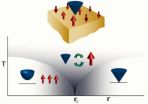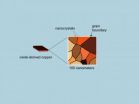(Press-News.org) Drastically improved efforts to provide modern energy access to the poor opens up a new approach to development efforts and action on climate change, an international group of energy and environment scholars say in a new report, Our High-Energy Planet. The report is the first of three in the Climate Pragmatism project, a partnership of Arizona State University's Consortium for Science, Policy, and Outcomes (CSPO) and The Breakthrough Institute.
"Climate change can't be solved on the backs of the world's poorest people," said Daniel Sarewitz, a report coauthor and co-director of CSPO. "The key to solving for both climate and poverty is helping nations build innovative energy systems that can deliver cheap, clean, and reliable power."
More than one billion people globally lack access to electricity, and billions more burn wood and dung for their basic energy needs. The report outlines a radically new framework for meeting the energy needs of the global poor. According to the authors, the massive expansion of energy systems, mainly carried out in the rapidly urbanizing global South, is the only robust, coherent, and ethical response to the global challenges we face, climate change among them. The time has come to embrace a high-energy planet.
Innovation is the key to reducing emissions while expanding energy access. Power sectors are growing at breakneck speed in emerging nations, and their development creates tremendous opportunities for innovation. For instance, in order to reduce energy poverty within their borders, China and India are pioneering the use of advanced nuclear generation and carbon capture and storage (CCS). To continue and accelerate this progress, wealthy nations must support energy sector growth, and provide leadership in their own modernization efforts. America's longstanding commitment to innovation, for example, has helped drive its move from coal to include nuclear, renewables, and natural gas.
The poverty, inequality, health problems, and environmental degradation that result from a reliance on traditional fuels can be alleviated most effectively through a commitment to truly equitable energy access. Such a commitment, the authors argue, "empowers growth and development using the broadest array of energy services, technologies, and policies that can meet the manifold needs of developing societies." This provides the foundation for the innovations that will transition the world toward a high-energy, low-carbon future.
INFORMATION:
New climate pragmatism framework prioritizes energy access to drive innovation/development
'Our High-Energy Planet' is the first of 3 planned reports from the Climate Pragmatism project
2014-04-09
ELSE PRESS RELEASES FROM THIS DATE:
Vigilance for kidney problems key for rheumatoid arthritis patients
2014-04-09
Rochester, Minn. — Rheumatoid arthritis patients are likelier than the average person to develop chronic kidney disease, and more severe inflammation in the first year of rheumatoid arthritis, corticosteroid use, high blood pressure and obesity are among the risk factors, new Mayo Clinic research shows. Physicians should test rheumatoid arthritis patients periodically for signs of kidney problems, and patients should work to keep blood pressure under control, avoid a high-salt diet, and eliminate or scale back medications damaging to the kidneys, says senior author Eric ...
Researchers discover dangerous ways computer worms are spreading among smartphones
2014-04-09
VIDEO:
Professor Kevin Du and his team at Syracuse University have identified apps that could cause problems for smartphone users, allowing hackers easy access to sensitive information.
Click here for more information.
Professor Kevin Du and a team of researchers from the College of Engineering and Computer Science at Syracuse University have recently discovered that some of the most common activities among smartphone users—scanning 2D barcodes, finding free Wi-Fi access points, ...
Stanford scientists model a win-win situation: Growing crops on photovoltaic farms
2014-04-09
Growing agave and other carefully chosen plants amid photovoltaic panels could allow solar farms not only to collect sunlight for electricity but also to produce crops for biofuels, according to new computer models by Stanford scientists.
This co-location approach could prove especially useful in sunny, arid regions such as the southwestern United States where water is scarce, said Sujith Ravi, who is conducting postdoctoral research with professors David Lobell and Chris Field, both on faculty in environmental Earth system science and senior fellows at the Stanford Woods ...
Medication therapy management works for some but not all home health patients
2014-04-09
WEST LAFAYETTE, Ind. — Low-risk Medicare patients entering home health care who received medication therapy management by phone were three times less likely to be hospitalized within the next two months, while those at greater risk saw no benefit, according to a study led by Purdue University.
The study helped determine which patients benefit most from medication therapy management by phone and a way to identify them through a standardized risk score, said Alan Zillich, associate professor of pharmacy practice at Purdue, who led the research.
"Hopefully, this study ...
UC-led research finds chips with olestra cause body toxins to dip
2014-04-09
According to a clinical trial led by University of Cincinnati researchers, a snack food ingredient called olestra has been found to speed up the removal of toxins in the body.
Results are reported in the April edition of the Journal of Nutritional Biochemistry.
The trial demonstrated that olestra—a zero-calorie fat substitute found in low-calorie snack foods such as Pringles—could reduce the levels of serum polychlorinated biphenyls (PCBs) in people who had been exposed to PCBs.
High levels of PCBs in the body are associated with an increase in hypertension and diabetes. ...
Gusev Crater once held a lake after all, says ASU Mars scientist
2014-04-09
TEMPE, Ariz. - If desert mirages occur on Mars, "Lake Gusev" belongs among them. This come-and-go body of ancient water has come and gone more than once, at least in the eyes of Mars scientists.
Now, however, it's finally shifting into sharper focus, thanks to a new analysis of old data by a team led by Steve Ruff, associate research professor at Arizona State University's Mars Space Flight Facility in the School of Earth and Space Exploration. The team's report was just published in the April 2014 issue of the journal Geology.
The story begins in early 2004, when NASA ...
One kind of supersymmetry shown to emerge naturally
2014-04-09
UC Santa Barbara physicist Tarun Grover has provided definitive mathematical evidence for supersymmetry in a condensed matter system. Sought after in the realm of subatomic particles by physicists for several decades, supersymmetry describes a unique relationship between particles.
"As yet, no one has found supersymmetry in our universe, including at the Large Hadron Collider (LHC)," said the associate specialist at UCSB's Kavli Institute for Theoretical Physics (KITP). He is referring to the underground laboratory in Switzerland where the famous Higgs boson was identified ...
Violence intervention program effective in Vanderbilt pilot study
2014-04-09
Violent behavior and beliefs among middle school students can be reduced through the implementation of a targeted violence intervention program, according to a Vanderbilt study released in the Journal of Injury and Violence Research.
Manny Sethi, M.D., assistant professor of Orthopaedic Surgery and Rehabilitation, and his Vanderbilt co-authors evaluated 27 programs nationwide as part of a search for an appropriate school-based violence prevention program.
Their findings led to a single, evidence-based conflict resolution program that was evaluated in a pilot study of ...
Stanford scientists discover a novel way to make ethanol without corn or other plants
2014-04-09
Stanford University scientists have found a new, highly efficient way to produce liquid ethanol from carbon monoxide gas. This promising discovery could provide an eco-friendly alternative to conventional ethanol production from corn and other crops, say the scientists. Their results are published in the April 9 advanced online edition of the journal Nature.
"We have discovered the first metal catalyst that can produce appreciable amounts of ethanol from carbon monoxide at room temperature and pressure – a notoriously difficult electrochemical reaction," said Matthew ...
Novel approach to accelerate metabolism could lead to new obesity treatment
2014-04-09
BOSTON – By manipulating a biochemical process that underlies cells' energy-burning abilities, investigators at Beth Israel Deaconess Medical Center (BIDMC) have made a novel discovery that could lead to a new therapy to combat obesity and diabetes.
Published in the April 10 issue of the journal Nature, the new findings show that reducing the amount of nicotinamide N-methyltransferase (NNMT) protein in fat and liver dramatically reduces the development of obesity and diabetes in mice.
'With this discovery, we now have a means of metabolic manipulation that could ...
LAST 30 PRESS RELEASES:
ASU researchers to lead AAAS panel on water insecurity in the United States
ASU professor Anne Stone to present at AAAS Conference in Phoenix on ancient origins of modern disease
Proposals for exploring viruses and skin as the next experimental quantum frontiers share US$30,000 science award
ASU researchers showcase scalable tech solutions for older adults living alone with cognitive decline at AAAS 2026
Scientists identify smooth regional trends in fruit fly survival strategies
Antipathy toward snakes? Your parents likely talked you into that at an early age
Sylvester Cancer Tip Sheet for Feb. 2026
Online exposure to medical misinformation concentrated among older adults
Telehealth improves access to genetic services for adult survivors of childhood cancers
Outdated mortality benchmarks risk missing early signs of famine and delay recognizing mass starvation
Newly discovered bacterium converts carbon dioxide into chemicals using electricity
Flipping and reversing mini-proteins could improve disease treatment
Scientists reveal major hidden source of atmospheric nitrogen pollution in fragile lake basin
Biochar emerges as a powerful tool for soil carbon neutrality and climate mitigation
Tiny cell messengers show big promise for safer protein and gene delivery
AMS releases statement regarding the decision to rescind EPA’s 2009 Endangerment Finding
Parents’ alcohol and drug use influences their children’s consumption, research shows
Modular assembly of chiral nitrogen-bridged rings achieved by palladium-catalyzed diastereoselective and enantioselective cascade cyclization reactions
Promoting civic engagement
AMS Science Preview: Hurricane slowdown, school snow days
Deforestation in the Amazon raises the surface temperature by 3 °C during the dry season
Model more accurately maps the impact of frost on corn crops
How did humans develop sharp vision? Lab-grown retinas show likely answer
Sour grapes? Taste, experience of sour foods depends on individual consumer
At AAAS, professor Krystal Tsosie argues the future of science must be Indigenous-led
From the lab to the living room: Decoding Parkinson’s patients movements in the real world
Research advances in porous materials, as highlighted in the 2025 Nobel Prize in Chemistry
Sally C. Morton, executive vice president of ASU Knowledge Enterprise, presents a bold and practical framework for moving research from discovery to real-world impact
Biochemical parameters in patients with diabetic nephropathy versus individuals with diabetes alone, non-diabetic nephropathy, and healthy controls
Muscular strength and mortality in women ages 63 to 99
[Press-News.org] New climate pragmatism framework prioritizes energy access to drive innovation/development'Our High-Energy Planet' is the first of 3 planned reports from the Climate Pragmatism project





